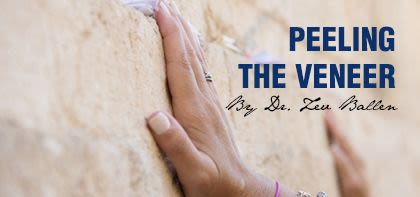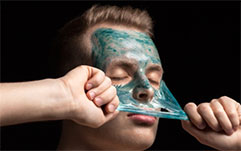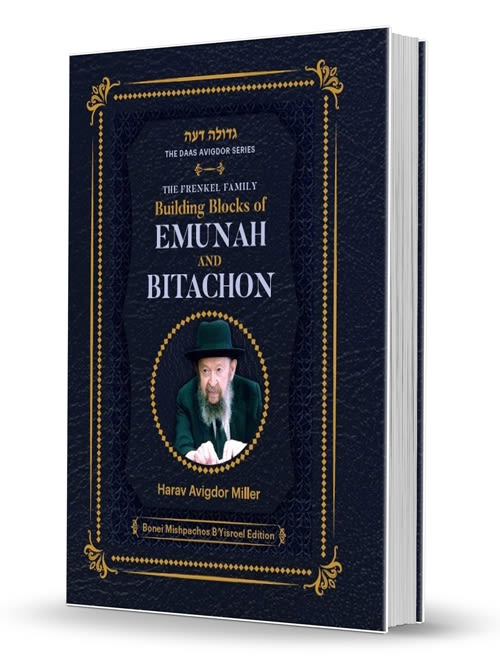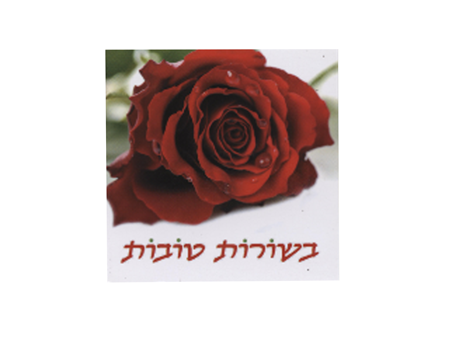
Peeling the Veneer
She started to doubt G-d, and to doubt the purpose and point of all the rules that religious Jews keep. In her secret soul, she started to wonder what good it was doing her…

Rochel has been having a very hard few years. Like many of us, she didn’t grow up religious, but she got interested in Judaism while she was still a young woman, and ended up marrying a religious returnee, like herself.
They did what religious people are meant to do, and moved into a religious neighborhood and had a lot of kids very quickly. Rochel was very obedient, and did everything she was told to do. She didn’t always believe in what she was doing, she didn’t always understand what she was doing, but she still went along with it, did what she was told, and didn’t ask any questions.
Then, three years ago, she and her husband experienced what psychologists describe as the highest stressor there is – the death of a child. Understandably, this was an incredibly difficult experience for Rochel, and in many ways, it broke her completely.
She started to doubt G-d, and to doubt the purpose and point of all the rules that religious Jews keep. In her secret soul, she started to wonder what good it was doing her, or the world, for that matter, to be keeping all these “arcane” laws. From the outside, it’s easy to see that Rochel was incredibly angry with  G-d, and with Judaism, after the death of her son. But Rochel herself didn’t really understand what was happening to her. All she knew is that secretly, she started to break the Sabbath.
G-d, and with Judaism, after the death of her son. But Rochel herself didn’t really understand what was happening to her. All she knew is that secretly, she started to break the Sabbath.
It would be a light switch here, a few degrees up or down on the air-conditioning there – all very small and easy to hide, because she was still living in a religious neighborhood, and still raising her remaining children as G-d fearing Jews, and sending them to religious schools.
But Rochel was in hibernation mode, secretly breaking the Sabbath, secretly angry at G-d, and completely stuck. She wasn’t speaking about what she was feeling or doing; she wasn’t asking any questions, or bouncing things off of other people who could have given her support, and let her have a voice. So it was just getting worse and worse, with no end in sight.
Eventually, Rochel got to that blessed state of being so sick of things, that she had an epiphany and decided: “I can’t live like this anymore! It’s so hypercritical! I want the truth, now. I honestly want to know what is going on, and why I’m thinking and feeling and doing all these things.”
Remember, Rochel didn’t grow up in a religious family, but her kids are coming home from schools where they are being taught that G-d finds irreligious behavior to be unacceptable. Rochel started to wonder, “What kind of G-d is this? What did I sign up for, when I became religious?’
Unfortunately, there are religious Jewish places that talk and teach that way. But Rabbi Shalom Arush’s yeshiva, Chut Shel Chessed, isn’t one of them. What Rabbi Arush is constantly teaching his students is that G-d doesn’t see any bad in us at all. He only sees the good.
As I explained to Rochel, if we feel we did something bad, or feel discouraged, or think that G-d is mad at us, then we can be sure that that particular thought didn’t come from G-d. It came from the forces of falsehood and evil in the world, or the Other Side. Rochel was amazed; she’d never heard that before. She couldn’t believe that G-d wasn’t angry with her, and not gearing up to punish her in a big way, for her deliberate desecration of the Sabbath.
I explained that breaking the Sabbath by turning the lights on and off, is still a very serious thing, and not to be condoned. But that G-d is much more interested in our desire to serve Him, from a place of whole-hearted truth and honesty, and much more interested in our genuine spiritual growth, than in keeping up appearances.
If it’s going to take us some time to figure everything out, and to work out where we’re really holding, and what’s really going on, then He’ll give us the time to get to a place where we can really own our religiosity, and do our mitzvot happily, because they are a privilege, instead of feeling that they are a terrible burden. G-d sees that we want to learn, and to progress and to improve, and that is something very different from dealing with a person who’s simply hiding all her doubts behind a “religious” veneer, and not speaking it out and retreating into herself.
I told Rochel that no one is perfect: I’m certainly not perfect; Rabbis aren’t perfect; everyone, on their own level, still has a lot of things to work on. That’s why we need to talk to G-d, come clean, and explain to Him exactly what’s going on with us, and what we need His help with. When G-d, who understands everything that we’ve gone through in our lives sees us turning to Him in truth, He helps us every single time.











7/19/2018
Candid
Thank you for being so open and honest and human about Torah observance.
7/19/2018
Thank you for being so open and honest and human about Torah observance.
5/02/2018
Very honest and authentic article
Wish everyone would read this; it shows how to deal with yourself, others, and with God.